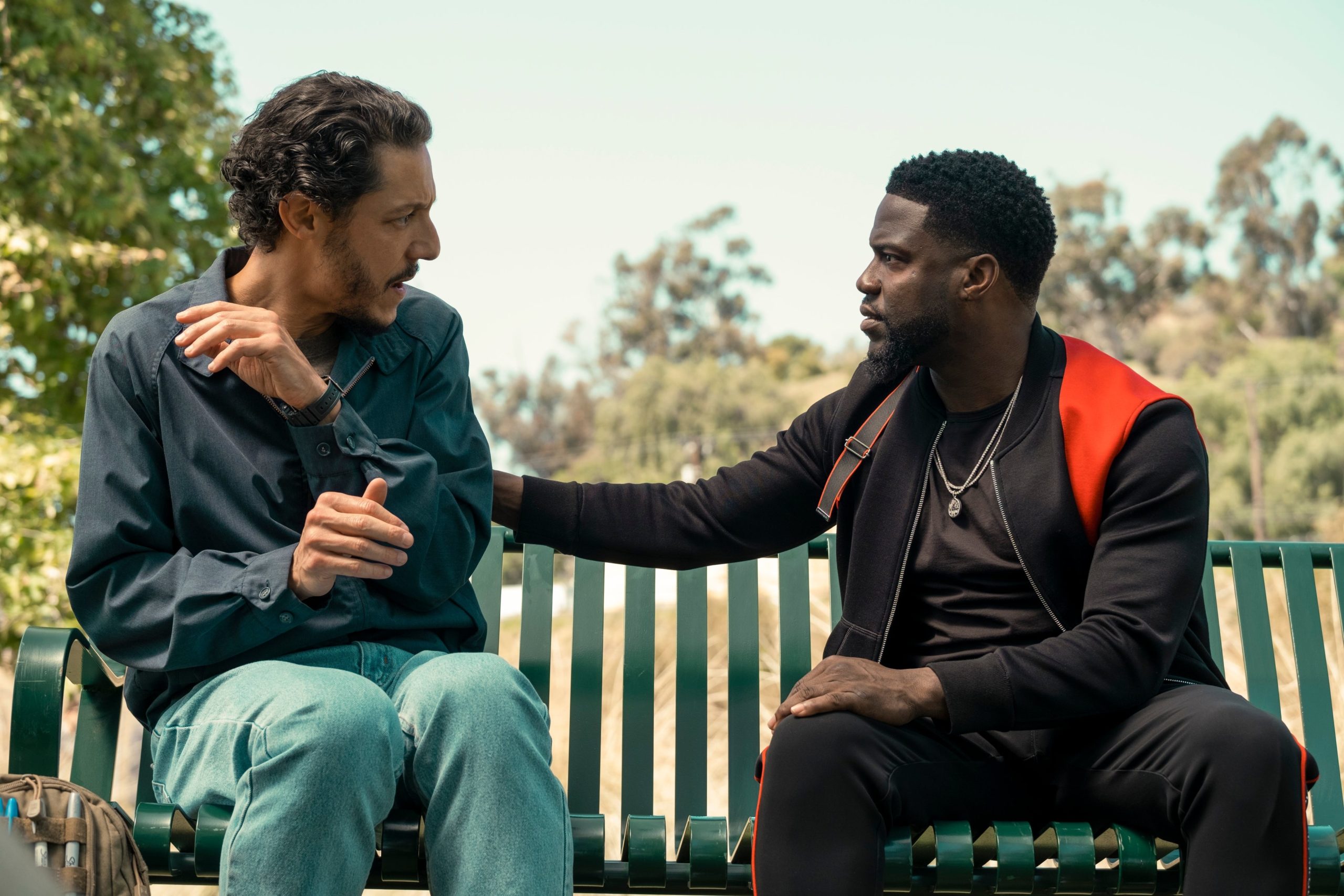In Netflix’s new limited series True Story — created by Narcos: Mexico executive producer Eric Newman — Kevin Hart stars as Kid, a barely-fictionalized version of himself who’s at the top of his comedic game and in the thick of promoting a new superhero movie that’s poised to rake in a cool $US1 (A$1.4`) billion at the box office.
True Story, which Hart also executive produced, makes little effort to downplay that Kid — an embattled, but good-hearted performer trying to navigate the perils of Hollywood — is meant to be an analogue for the comedian, who has a history of damaging his reputation and public image by making homophobic jokes. But unlike Hart, who’s been able to recover somewhat from the backlash caused by crappy, old jokes about gay people, the predicament Kid finds himself in is significantly more serious than the imagined specter of cancel culture.
In the series, Kid wakes up from a night of heavy drinking and partying with his brother Carlton (Blade’s Wesley Snipes in the first of several superhero characters in the show) next to Daphne (Ash Santos). He’s not exactly sure who she is, other than the person lying next to him in bed, or what all they might have gotten up to before passing out. What the brothers are sure of, though, is that Daphne’s died of a drug overdose, and while neither man physically harmed her themselves, it very much seems like they did.

True Story’s first few episodes follow the brothers as a dazed Kid tries to make sense of what’s happened, and Carlton steps up to put right the biggest mess his little brother’s ever gotten himself into. In the way that Kid — who was recently sober up until the night of the incident — begins to emotionally spiral at first, and Carlton starts concocting a plan to dispose of the body, True Story shows you what sort of dynamic the pair had in the past before Kid made it big, and why their present-day relationship is so thorny. Being in his native Philadelphia to promote a superhero film called Antiverse brings Kid some degree of comfort because he’s home. However, the city also brings forth memories of the hardship he left behind as his career began to take off — the sorts of hardship that Carlton took to dealing with using his own, generally-crooked methods. As much tension as Carlton’s shadiness and tendency create between him and his brother, the situation Kid’s in and his intense fear makes it easier for him to go along with his brother’s advice to bring in a fixer named Ari (The Phantom’s Billy Zane) who can remove Daphne’s body from the hotel without anyone noticing.
Laughable as the idea is that Kevin Hart would compare his own (non)cancellation to the consequences a celebrity implicated for murder would face, True Story manages to be something more than a sympathetic vanity project through its characterization of the people around Kid and its focus on the world he exists in. Though everything True Story shows you about Antiverse through clips is played for jokes about real-world cape franchises and the studios that produce them, in the world of the show, it’s a serious phenomenon that’s catapulted Kid to a new level of notoriety that makes moving through the world as just a person infinitely more complicated. Ari, for instance, has no problem taking care of Daphne’s remains, but when he sits Kid down to discuss his payment, the comedian realises that all the news about his recent Antiverse payday has put Ari in a position to ask him for millions rather than a few thousand dollars. Predictable as some of True Story’s plot twists are, Ari’s death is one that manages to be surprising because of how incapable of strangling someone Kid initially seems. He is, though, and it’s Ari’s death more so than Daphne’s that really gets True Story going.

More drama than a dark comedy, True Story tries to make you feel the professional and personal stresses weighing Kid down while he’s trying not to think about the fact that he and his brother have now played a hand in two people dying. Antiverse’s success is everything Kid ever wanted, but the world and his sizable fandom watching his every move makes actually being able to enjoy that success difficult. Though it easily could have spent a few episodes dunking on fans outright, the writers opted for the more nuanced and compelling route with Gene (Luke Cage’s Theo Rossi), a longtime superfan of Kid’s who follows him from show to show. Gene’s enough of a fixture at Kid’s comedy shows that everyone in his entourage is familiar with him, and knows that he’s harmless (despite seeming like a burgeoning stan). He’d never dream of hurting Kid — his hero and idol whose comedy helped him get through a period of emotional darkness — but he does tail him the night he and Carlton dump Ari’s body. And he manages to catch them in the act on camera.
True Story repeatedly touches on the idea of the relationships between celebrities and fans not exactly being what either party thinks they are throughout the season. Kid’s shown as having something like affection for some of his fans (like sick children eager to see his movie), but a cautiousness when it comes to how he engages with other adults who sometimes don’t have the wherewithal to understand how they’re overstepping personal boundaries. Gene, who is not exactly of sound mind, comes to Kid to tell him about the footage, and while it’s out of a genuine desire to let him know that he doesn’t mean to tell, Kid has every reason to panic. Instead, he decides to bring Gene closer into his social circle, figuring that he can convince the man to delete the incriminating video.
It’s during the time that Gene and Kid spend together that True Story’s at its most interesting because of the different messages about fandom it plays with as it builds to one of its more impactful turns. Easy as it is for Gene to think of himself as a fan, and as Kid as someone who loves his fans, when he witnesses Kid humiliate another “fan,” who is white, for his overt anti-Black racism, he struggles to reconcile his jumbled emotions. It’s difficult for Gene to see Kid going after someone in an audience because to Gene, Kid “the person” has always been secondary to Kid “the performer” in their intense parasocial relationship.

Kid could explain to Gene why his white fans repeating some of his jokes back to him verbatim is an insidious form of racism that doesn’t get checked nearly as often as it should, but he shouldn’t have to — both because it’s obvious, and because it’s none of Gene’s business, really. Even if he did, True Story implies that Gene might not have been able to grasp what Kid was getting at, again, because in his mind, celebrities aren’t meant to treat fans that way. As telling as Gene may have thought Kid’s behaviour towards the other fans was, True Story presents their actual friendship as the real red flag that only the audience is privy to.
Though both Gene and Kid let go of the idea that their friendship’s only about keeping the truth about Ari’s body quiet, Carlton — who Ari’s associates suspect may be involved in his death — does not. So when it seems like they might come after him, he comes up with another idea that leads to someone dying. In Gene’s final moments, as Ari’s brothers beat him to death, most of the larger picture becomes clear to him. In his strange logic, Gene grasps hold of the idea that by taking blame for Ari’s death, he’s doing Kid, his good friend, the ultimate solid, and it gives him the tiniest bit of comfort as his life comes to an end.
True Story presents the tragedy of Gene’s fate in a way that makes you think that it might legitimately devastate Kid when he hears about what happens, but instead, he’s able to keep things in his life moving in a way that might hurt Gene if he could see it. Whatever burgeoning feelings of friendship Kid had for him, none of it changed the fact that in the end, Gene was a fan whose obsession with Kid turned him into a liability, and put them both in imminent danger. In Gene, True Story’s not saying that being a fan of celebrities is necessarily a bad thing, but that losing one’s self in idealised fantasies about other people — particularly famous ones — can lead to the most ultimate of disappointments.
True Story is now streaming on Netflix.
